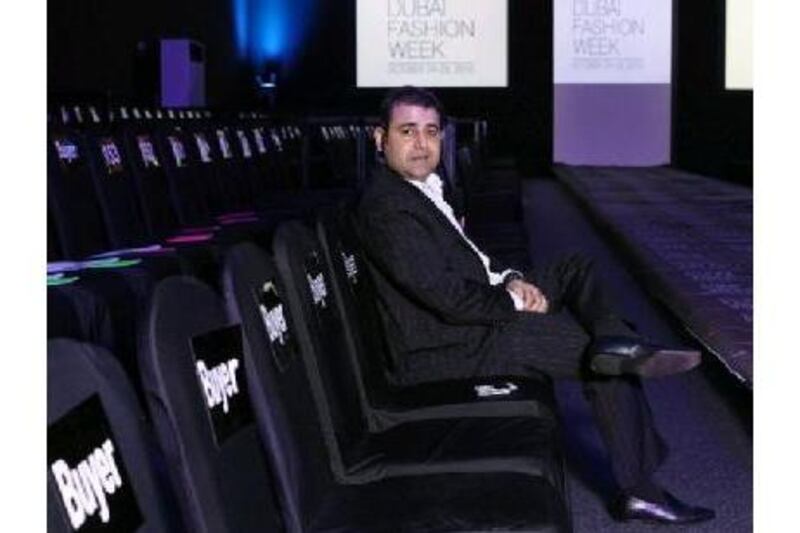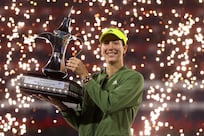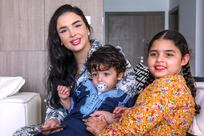Some pretty mean things have been said about Dubai Fashion Week over the seasons, and not without justification.
It has been an event that has relished the glamorous side of fashion, inviting its guests to play fashion one-upmanship over front-row seats and blingy parties, but by all accounts it achieved very little in the way of sales for the designers showing their next-season collections.
So Manoj Bhojwani, the chairman of Capital Marketing, the company that has taken over Dubai Fashion Week following Concept's "restructuring", has a big job ahead of him. If he's going to persuade not only Dubai's fashionistas but also the world's buyers that the UAE can be a centre for Middle Eastern design and has a fashion week worth attending - in preference to second-tier fashion weeks such as, say, Sydney, São Paulo or Shanghai - there is work to be done.
It was, then, an interesting decision to re-employ certain members of the fashion week's former team, including Rohit Sabhiki, the general manager of the show, and Marc Robinson, the director.
"They were available, and they were kind enough to have faith in me, the new management, because they had some rough times with the earlier management, which I had no control over," says Bhojwani. "I don't know what happened between them, I have absolutely no idea, but when I employed Rohit that was the first time I met him. I told him what my plans were, he found them very interesting, and I'm sure he did some research on me."
Those plans are, of course, what Dubai's fashionistas are interested in: how exactly does Bhojwani intend to improve the flailing event? Well, firstly, he acknowledges that, after less than four months at the helm, this season will be little different except in one crucial aspect: execution.
"I don't want to comment on what Concept did wrong, but I will definitely tell you what I'm going to do. I think the main thing would be to try to do this technically right: first things first. The backstage, the team has to be correct, the set-up has to be correct. We've paid extra attention to the set-up this time, right from the lighting, the sound, from the layout of the entire thing. It took us a long time to finalise the venue."
This season, DFW is being held at Atlantis in the Afateer Tent, some way from the hotel itself ("I wanted to keep away from the hotel. If you see fashion weeks in New York - I'm not trying to compare myself again! - or Paris, they are done anywhere.")
And certainly for the first show, Pink Neon by Mona Fares, there was a healthy crowd on Sunday. The venue is small but has room for designers' booths, where the buyers can review the catwalk collections, and the production quality is a step up from earlier seasons as well.
For the real business of fashion - the trade between designers and buyers - Bhojwani is waiting until next season to make a real difference. "We have plans to bridge this gap in the next season, when we are planning to bring in client servicing, which means post-fashion week there will be a dedicated team of people who will be liaising between the designers and the buyers. This will be an extra service we will be offering from next season, not this season.
Everything takes time."
Time is, though, the thing that Bhojwani can't afford to waste: it will, he readily admits, take some time before the reputation of the fashion week is restored.
"I would not take any responsibility for what happened prior to my takeover. I take full responsibility for what will happen post the takeover by Capital. With all due respect to everybody who has negative comments, all I say is give it a chance, Rome was not built in one night; it will take time to correct this; it's not going to happen overnight."
You can see why: just a few of the other changes planned by Bhojwani include turning the new advisory board into an active, functioning governing body with responsibilities that include looking after buyers, sponsors, communication and designer selection; introducing more GCC designers; persuading the Dubai government to support the fashion week with a fashion council and setting up roadshows around the GCC, subcontinent and Levant. It's easy to scoff at his optimistic belief that six seasons will see international recognition for Dubai Fashion Week, but he remains confident.
"Let's say six seasons down I expect the brand to be taken seriously and recognised by the big four. Ten to 12 seasons, you won't be able to ignore us any more."










